Drinking alcohol is a part of many people’s social lives, and there are many reasons why they drink. It can be a way to celebrate, relax, or simply as an accompaniment to food. But, how does alcohol affect the brain?
Brain Shrinkage

Shrinkage happens because neurons die off when they are no longer needed or used. Alcohol can damage these neurons and cause them to die without ever being used again, which leads to shrinkage of some regions of the brain. This shrinkage often occurs in areas such as the hippocampus, which links to memory loss and problems with learning, leading to alcohol hospitalization in some cases.
Brain shrinkage is only the beginning of what happens to your brain when you drink alcohol. Many other changes can occur in this organ. Knowing about these effects may help people make better decisions regarding their drinking habits and overall health.
Dementia
Although alcohol is a depressant, it can still cause brain damage. Alcohol causes fever, among other things, making you use more of your brain to regulate body temperature. That puts an extra burden on your hippocampus, leading to memory loss or even dementia as you get older if you regularly drink too much. And this is, of course, if you are not addicted to alcohol.
Drinking too much can damage the frontal lobe, leading to poor judgment and reasoning skills, causing impulsive behavior, memory loss, and difficulty speaking or walking normally.
Poor Blood Circulation in the Brain
Poor blood circulation to the brain results in a lack of oxygen and nutrients; this is the beginning of the effects of alcohol on the brain. When this occurs, both short-term and long-term effects can occur as well as memory loss. The more you drink, the worse it gets. Unfortunately, this also affects your brain cells, leading to permanent damage or even death if not treated immediately.
Alcohol abuse can cause or worsen other brain problems, such as brain cells dying quickly if they are not getting the oxygen and nutrients they need. In addition, alcohol abuse can affect your decision-making, judgment, memory, and coordination, leading to more car accidents than those who do not drink at all.
Hallucinations

Memory loss and blackouts are familiar with alcohol use. The more you drink, the worse these effects become as your brain cells die faster than they get replaced. These changes make it difficult for a person to remember what happened while intoxicated or drinking heavily, so many people experience memory gaps when using alcohol regularly.
People who experience hallucinations may see, feel, hear, or smell things that are not there. Alcohol can have different effects on people with this condition depending upon the type of hallucination they are experiencing. For example, someone might perceive something as being present when it is not there at all.
When a person uses alcohol and experiences visual hallucinations, they are more likely to have an even stronger reaction when they are sober. When a person is under the influence of alcohol, their brain processes information in unusual ways that can cause them to see, feel, or hear things that do not exist in reality.
Psychosis
If you drink large amounts of alcohol regularly, it can lead to psychosis. Psychosis is not the same as schizophrenia or another mental health disorder; instead, it’s an altered state in which judgment and perception get impaired. To a person in psychosis, what seems real may not be, and even hallucinations and delusions can seem completely normal.
The risk of psychosis increases with the amount and frequency of alcohol consumed. Symptoms may include paranoia or extreme suspicion that others want to cause harm, hearing, seeing, tasting, smelling, or feeling things that aren’t there, and a false belief about what’s happening.
Changes In Mood
Increased self-confidence, confusion, and slurring of speech are some changes in mood that may occur when you use alcohol. This means that people will be more likely to engage in behavior they usually avoid if they use too much alcohol, such as saying something impulsive or aggressive.
Although alcohol may make you feel more self-confident, it is a depressant and can lower your inhibitions or ability to control yourself. This may result in the behavior you later regret. Alcohol also affects your coordination and balance, which can change the way you think and behave.
Conclusion
The brain is a complicated organ. As a result, alcohol can have detrimental effects on your cognitive function, mood, and even physical health. If you’re wondering if alcohol could be affecting your memory or mental clarity, take the Alcohol-Induced Brain Syndrome Test.

